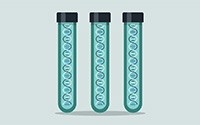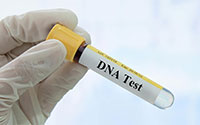
What Is Genetic Testing for Cancer?
Cancer begins with atypically rapid cell growth and division. The excess cells then build up, bind together and form tumors. Normally, cellular reproduction is tightly regulated by genes, but the process can be thrown off-kilter by a genetic mutation. In most cases, the genetic mutation that leads to the development of cancer is acquired; in other words, it develops during the patient’s lifetime, either randomly or due to a known cause such as smoking.
Can Cancer Be Genetic?
Certain aspects of cancer susceptibility are known to be inherited, and in some instances, scientists have identified the specific genes involved. Through genetic testing, it is possible to detect harmful variants in an individual’s genes that were inherited from a parent. For a patient who has already been diagnosed with cancer, genetic testing can be used to confirm that the malignancy is related to a hereditary syndrome. For the patient’s family members, genetic testing can be used to determine whether they have inherited the same harmful genetic variant. This information can be helpful when assessing individual cancer risk.
It is important to note that not everyone who inherits a specific cancer-susceptibility variant will ultimately develop cancer. There may be many other factors at play, such as environmental exposures and lifestyle practices, which can influence the development of cancer.
What Cancers Are Hereditary?
Researchers believe that inherited gene variants may contribute to the development of up to 10% of all cancers. Some malignancies that may run in families due to an inherited genetic variant include:
- Breast cancer
- Colorectal cancer
- Prostate cancer
- Ovarian cancer
- Uterine (endometrial) cancer
- Melanoma
- Pancreatic cancer
What Does Genetic Testing for Cancer Involve?
Genetic testing for cancer is usually performed on a small sample of bodily fluid or tissue, such as blood, saliva, skin cells or cheek cells (taken from inside the mouth). The sample is then sent to a laboratory that specializes in genetic testing. After the sample is analyzed, the results are returned to the medical professional who requested the test. The process can take several weeks or longer to complete.
Who Should Have Genetic Cancer Screenings?
Individuals who believe they may be at risk for cancer due to their personal or family history should talk with a genetic counselor. Some factors that may suggest a hereditary cancer syndrome include:
- A cancer diagnosis confirmed at a relatively young age
- Cancer in both organs of a paired set, such as the breasts, ovaries or kidneys
- Several first-degree relatives (parents, siblings or children) who have the same type of cancer
- Several family members who have breast or ovarian cancer, colorectal cancer or uterine (endometrial) cancer
- A birth defect that is known to be associated with an inherited cancer syndrome, such as noncancerous skin growths and skeletal abnormalities
In general, genetic testing is more informative if the process begins with an individual who has already been diagnosed with cancer. If that individual is confirmed to have an inherited cancer susceptibility syndrome, then his or her family members may want to consider genetic testing, even if they have not been diagnosed with cancer.
How Can Genetic Testing Inform Treatment for People Who Have Been Diagnosed
The results of genetic testing can help a cancer patient and his or her treatment team make better-informed treatment decisions. For example, the results can be used when determining the most appropriate surgical procedure or identifying potentially effective targeted immunotherapies.
If you would like to learn more or request a genetic risk assessment at Moffitt Cancer Center, call 1-888-663-3488 or complete a new patient registration form online. As our patient, you can feel confident that you are a top priority of a cancer center that delivers nationally ranked care in new and transformative ways.
Related Stories:
 Five Myths about Genetic Testing: Genetic testing has changed over the years, so it’s important to make sure you have all the right information before deciding if genetic testing is right for you. Read More
Five Myths about Genetic Testing: Genetic testing has changed over the years, so it’s important to make sure you have all the right information before deciding if genetic testing is right for you. Read More
 Do DNA Test Kits Invade Your Privacy? Users should be aware of the potential privacy concerns before buying (or gifting) these genetic at-home test kits. Read More
Do DNA Test Kits Invade Your Privacy? Users should be aware of the potential privacy concerns before buying (or gifting) these genetic at-home test kits. Read More
 Genetic Counseling and Testing: Our goal at Moffitt is to empower patients to make the right decision for themselves regarding genetic testing. Discover your options. Read More
Genetic Counseling and Testing: Our goal at Moffitt is to empower patients to make the right decision for themselves regarding genetic testing. Discover your options. Read More
